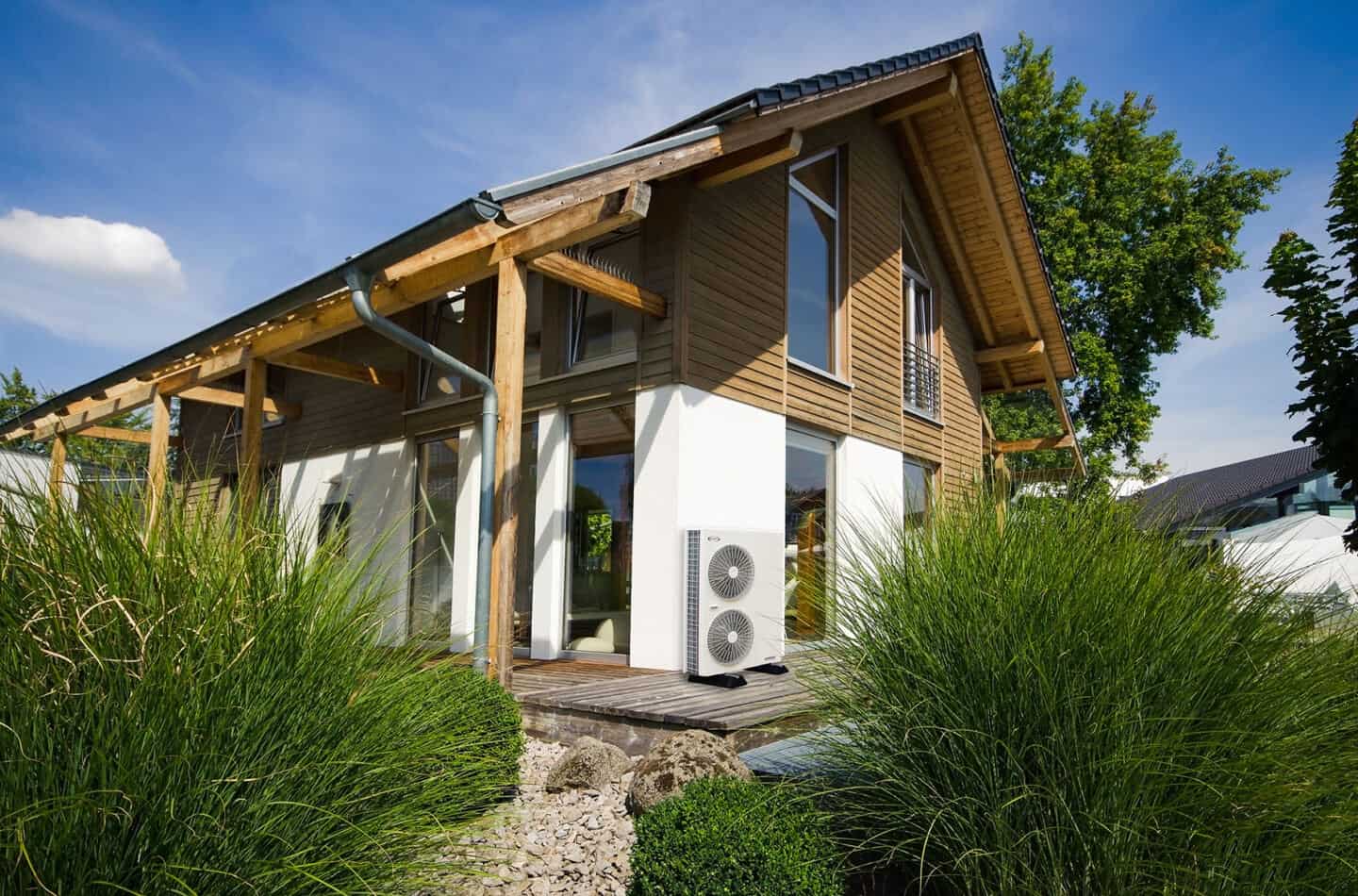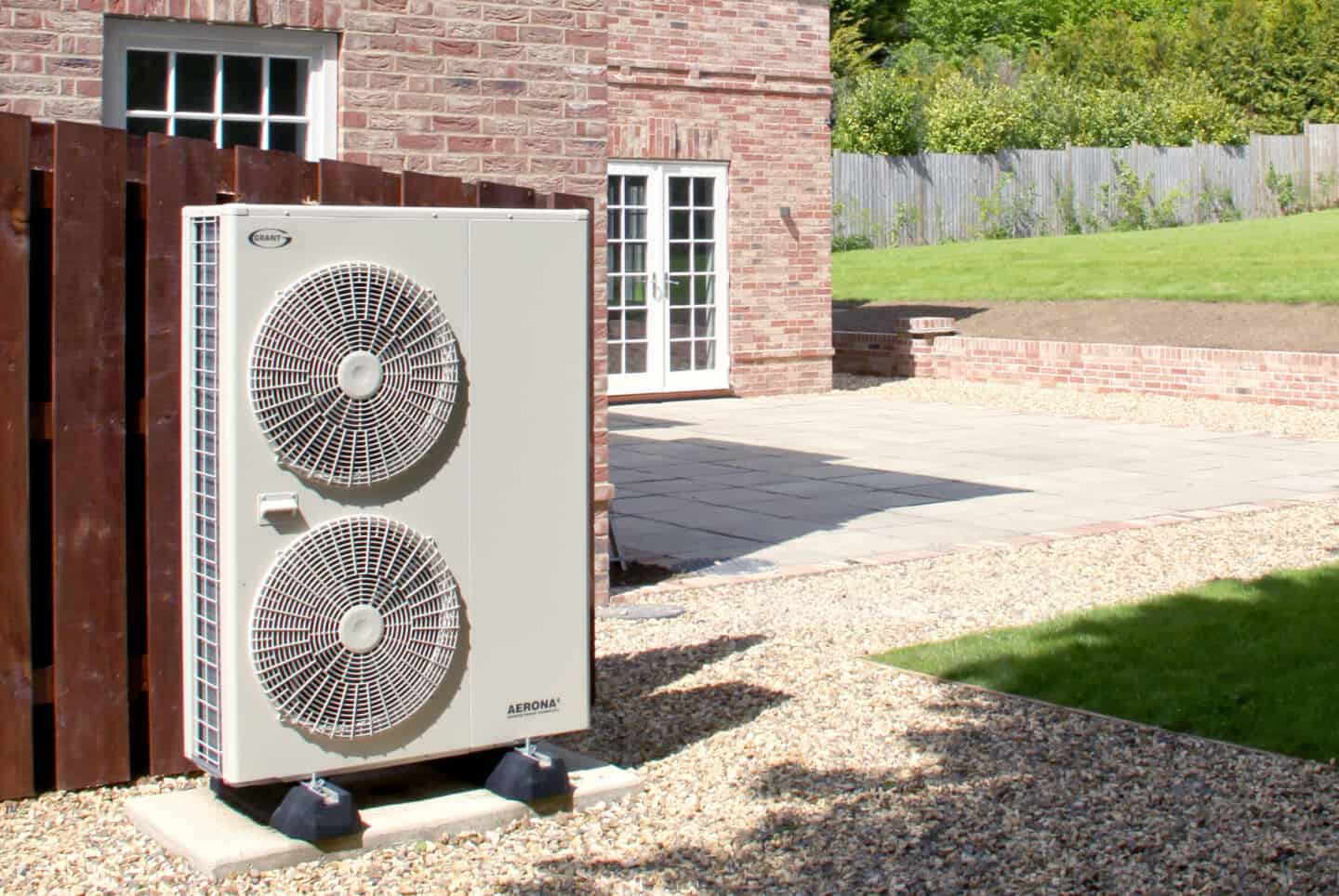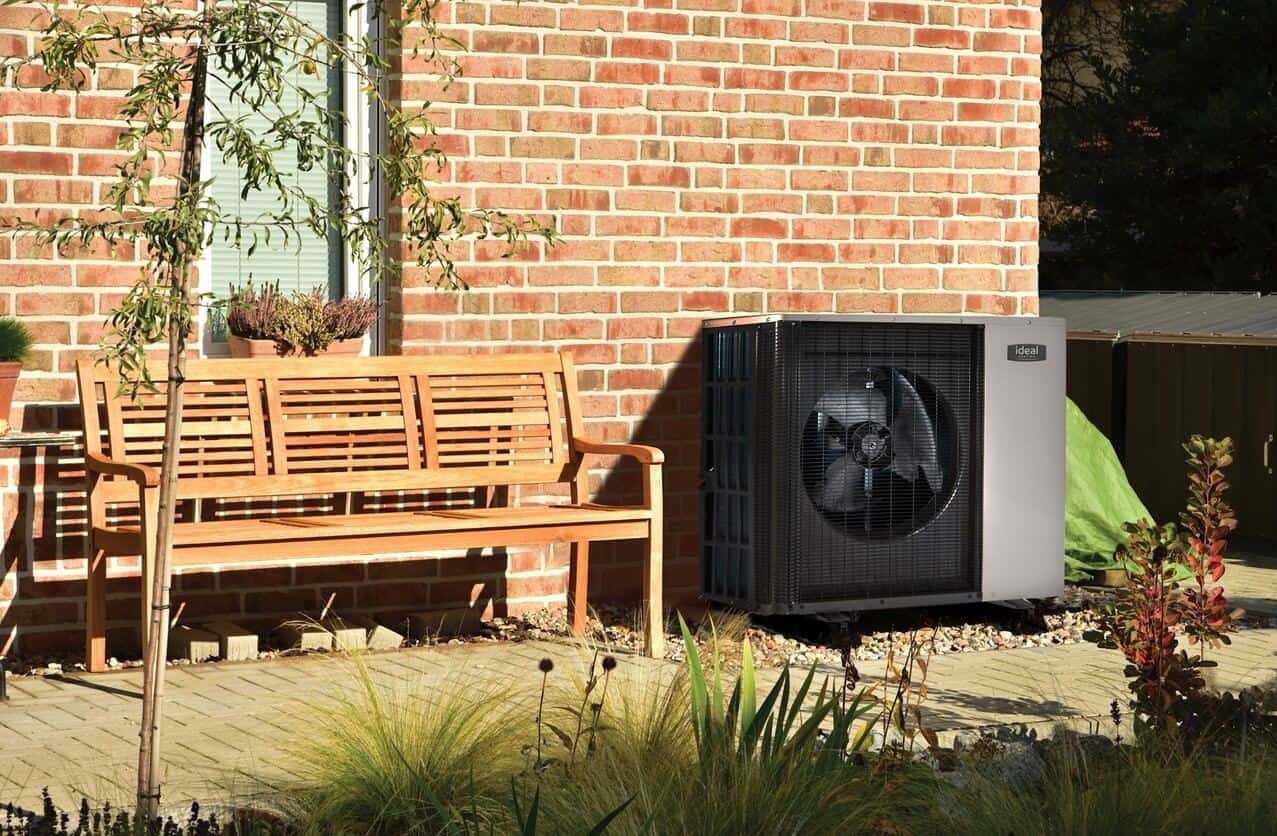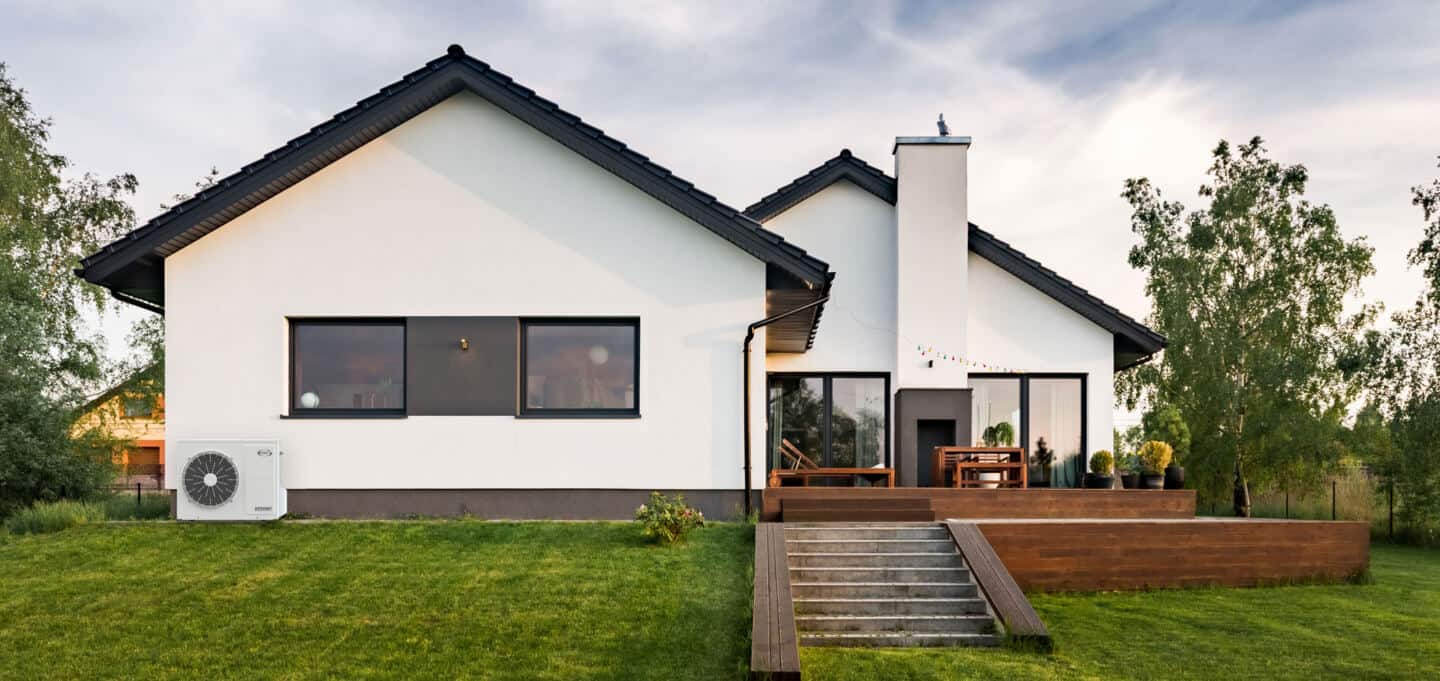
Grant Aerona³ R32 Air Source Heat Pumps for heating are Quietmark certified
As we become tired of dealing with skyrocketing energy bills and inefficient heating systems during the winter months, people are increasingly looking to heat pumps for heating their homes. Heat pumps are becoming more mainstream as we attempt to save money, make the most of our existing budgets and focus more on sustainability. But are heat pumps really the ultimate solution for heating our homes? Whether we’re looking to upgrade our heating system or build a new eco-friendly home, should we consider upgrading our heating systems to use heat pump technology? Let’s find out.
What is a Heat Pump?
A heat pump is a heating, ventilation, and air conditioning (HVAC) system that can be used to heat and cool spaces. Unlike traditional heating systems that rely on fossil fuels, heat pumps use electricity to transfer natural heat from the environment and distribute it throughout your home.
How Does a Heat Pump Work?
Heat pumps work on the principle of heat transfer. They extract heat from the air, ground, or water and transfer it to your living space. This is achieved through a refrigeration cycle that involves the use of a compressor, condenser, expansion valve, and evaporator. This process can keep your living space comfortable all year round.
Types Of Heat Pumps for Heating
Various heat pump types are available and rely on different mechanisms to operate.
Air Source Heat Pumps
Air source heat pumps are the most common. These extract air from the outside, accelerate the movement speed of particles inside the gas and then inject the hotter air into the home.
Because of the simplicity of the design, the average air source heat pump cost is lower than other types of heat pumps. However, the total financial outlay for these systems is more than for conventional gas boilers because of the novel way they generate heat.
Ground Source Heat Pumps
Ground source heat pumps work on the same principle but extract heat from the Earth instead of the air. These systems work well in cooler climates where air temperatures can plunge, making surface-based systems less effective.
Ground source heat pumps loop fluids around channels in the ground, collecting heat from the surroundings. Systems then compress the air and generate heat using electricity, just like other types of heat pumps.
Water Source Heat Pumps
Water source heat pumps are the rarest type and use the heat of rivers and lakes to transfer heat indoors. These are used in homes situated close to natural bodies of water.

Grant Aerona³ R32 Air Source Heat Pump is Quietmark certified
What are the Benefits of Heat Pumps for Heating?
Heat pumps offer a host of benefits that you can’t find when you purchase other systems such as conventional gas-powered boilers or electric heaters.
Energy Efficiency
The main benefit of using these systems is energy efficiency. Heat pumps can use as little as 25% of the energy of conventional systems to heat homes.
For many homeowners, this is the main advantage. Being able to get heating for a quarter of the regular cost is often the only selling point these systems require. Saving on energy bills in today’s economic climate is very welcome.
Note: It’s key to remember that where energy efficiency is concerned, it’s also important that your building isn’t leaking any heat in the first place. Checking for thermal bridging and poorly sealed gaps around doors and windows is a must before installation.
Environmentally Friendly
Heat pumps are also an environmentally friendly way to generate heat compared to burning gas or using electricity from a fossil fuel-powered power plant. These devices don’t burn any fossil fuels at all and use electricity intelligently to generate more heat than simply running current through resistor wires.
Versatility
Heat pumps are also versatile, meaning you can use them for heating and cooling a property. In warmer countries, this eliminates the need to install a separate air conditioning unit, helping you claw back some of the costs.
Safety
Finally, heat pumps are incredibly safe compared to conventional heating systems. Devices do not depend on high flows of electric current or need a pilot light to remain active even once you finish deriving heating from them. There’s also no risk of carbon monoxide poisoning, as there is with conventional heating systems.
Factors to Consider When Choosing a Heat Pump for Heating
Before choosing a heat pump, you’ll want to consider several factors. These help you determine whether it is the right choice for you or if a different system would serve you better.
The Upfront Cost
The first thing to know about heat pumps for heating is the upfront cost. These units aren’t cheap. However, many people still go ahead and buy them because of the long-term savings they offer. Plus, as mentioned earlier, many governments run schemes that subsidise the cost, helping their economies reach net zero faster. The UK government, for example, has a Boiler Upgrade Scheme that you can apply to for a grant of up to £7,500 towards the cost of buying and installing a heat pump.
The Performance In Cold Climates
While heat pumps are more efficient than most conventional heating systems, you’ll also want to consider their performance in colder climates. When temperatures drop below zero, it becomes harder for air source heat pump systems to provide adequate heating, undermining any efficiency benefits that they might bring. If you live in a colder region, bear this in mind. Ground source heat pumps operate much more efficiently in colder climates.
The Installation Process
Finally, you’ll also want to consider whether you want to endure the installation process, the main reason the upfront cost of these systems tends to be higher. That’s because you’ll need extra loops, space for outdoor units, and perhaps some exterior excavation work, depending on the system you want to install. You’ll also need to hook systems up to rooms in your home, which can also take a considerable amount of work. You may need to move out of your home for a time while you get the job done.

Ideal Logic Air 4kW Heat Pump is Quietmark certified
Switching To Heat Pumps
Don’t switch to heat pumps on a whim. Instead, consider your options and learn as much about the process as you can. Always talk to people in the industry who know what the process involves and research the best heat pump for heating your home based on your personal situation. You may discover that these devices aren’t suitable for you or you need a specific type of pump to make any future installation economical.
You’ll also want to consider whether you could take advantage of any incentives. As discussed, governments are keen for more people to install energy-efficient heat pumps to meet their net-zero pledges.
Don’t assume that you can’t get help, even if flagship programmes are no longer running in your area. It turns out that there are multiple ways you can get support for a heat pump installation, including various rebates and so on, depending on where you live.
Lastly, when switching to heat pumps, pick an installer you trust. Putting a heat pump in the ground or even one on an exterior wall is more challenging than you might think. Getting the right professionals to do it for you is highly recommended. Don’t use anyone who seems like they are just cashing in on the trend.
Installation and Maintenance of Heat Pumps
If you do decide to switch, proper installation and maintenance are crucial for the efficient and reliable operation of heat pumps.
Professional Installation
It is always recommended that you get a professional HVAC technician to install your heat pump. Proper installation will ensure optimal performance of the pump and prevent potential issues or damage that can occur from an incorrect installation.
Location and Placement
Think carefully about the location and placement of the heat pump. It should be installed in an area with good airflow and adequate space for maintenance. Outdoor units should be elevated and protected from debris and potential damage. A professional installer can advise you of this.
Seasonal Checks
Before each heating or cooling season, it’s important to undertake seasonal checks. A proactive approach to maintenance can help identify any issues before they become a more serious problem. You should inspect the system for any visible damage, test the thermostat and controls, check the electrical connections, verify proper airflow and replace air filters.
While there are some maintenance tasks that you can do yourself, such as cleaning or replacing air filters, it’s important to leave complex tasks to professionals. Attempting DIY maintenance without proper knowledge and tools can lead to damage or void your warranty.

Grant Aerona³ R32 Air Source Heat Pump is Quietmark certified
Common Misconceptions About Heat Pumps
Heat Pumps are Noisy
Many people believe that heat pumps are noisy and this can dissuade them from choosing this type of heating system. However, modern heat pump models are designed to operate quietly and have noise-reducing features. Outdoor units can also be strategically placed to minimize any potential noise impact.
Heat Pumps Require Frequent Repairs
Like any HVAC system, heat pumps require regular maintenance to ensure optimal performance. With proper installation and routine maintenance, heat pumps can provide reliable heating and cooling for many years without needing significant repairs.
Heat Pumps are Only Suitable for New Builds
Heat pumps can be installed in both new and existing homes. Retrofitting an existing home with a heat pump is possible, although it may require additional considerations and modifications which can be more costly.
In the long term, heat pumps offer reliable savings and better return on investment, but they may have higher upfront installation costs compared with traditional systems that provide only heating or cooling. With that said, you can get large government subsidies to lower the cost and sweeten the deal, depending on where you live and the house type you occupy.
How Much Does it Cost to Install a Heat Pump?
The cost of installing a heat pump varies depending on the design of the system, they type of heat pump you choose and the added cost of any modifications that you may need to make to accommodate the system if retro-fitting. In general, for an air source heat pump, you are looking at anywhere from £8k-£16k. For a ground source heat pump, you’re likely to pay between £18k-£40k because it requires a whole subterranean network in addition to the one on the surface.
So, heat pumps can be a versatile and cost-effective solution for helping you stay warm, save money, and reduce your environmental impact. However, whether it can be considered to be the ultimate heating solution completely depends on your unique situation. It is always advisable to seek professional help before making such a huge decision and large financial investment.
